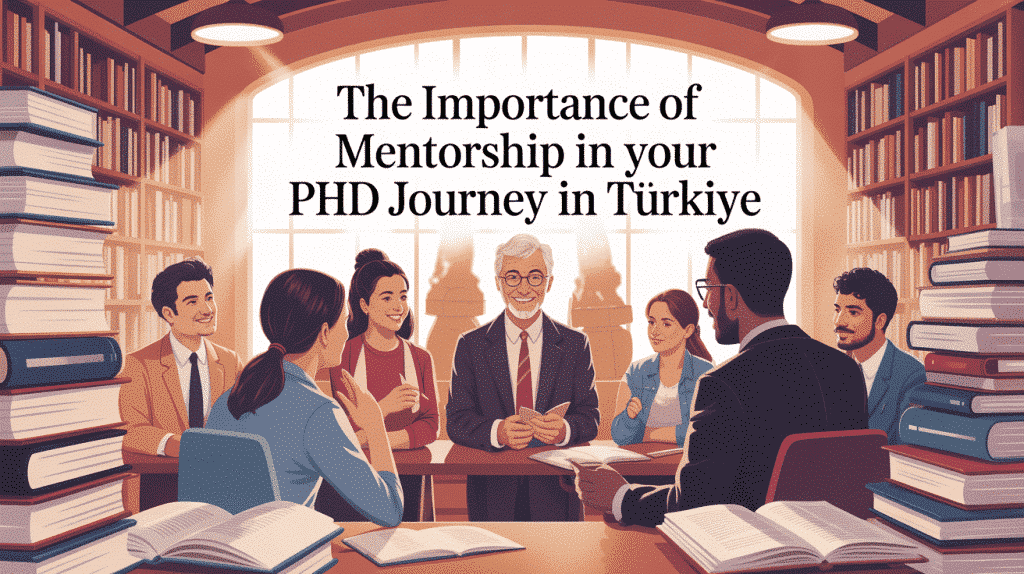The Importance of Mentorship Beyond Supervision During Your PhD in Turkiye
Mentorship vs. Supervision in Turkish Academia
In the context of Turkish higher education, the distinction between supervision and mentorship is particularly significant. With over 277,351 students pursuing graduate education in Turkiye (including 217,588 master’s students and 59,763 doctoral candidates), effective mentoring relationships can make a substantial difference in student outcomes.
The Nature of Supervision
Supervision is primarily concerned with guiding research methodology, reviewing written work, and ensuring that academic standards are met. This involves:
- Providing feedback on research proposals
- Ensuring adherence to ethical research guidelines
- Overseeing academic progress and timelines
The Broader Role of Mentorship
Mentorship, however, goes deeper, providing:
- Professional socialization into academic culture: Mentors introduce students to the norms, values, and expectations within academia.
- Career guidance and networking opportunities: A strong mentorship relationship can connect students with invaluable contacts and insights.
- Psychological and emotional support: Navigating a PhD program can be challenging, and mentorship can offer essential encouragement.
- Personal development beyond academic skills: Mentors help students cultivate soft skills crucial for their future careers.
Benefits of Effective Mentorship for PhD Students in Turkiye
Academic and Research Development
Strong mentorship relationships in Turkish universities facilitate collaborative research projects that enhance innovation and creativity. PhD students who engage in such collaborations often make significant contributions to their fields. Mentors in Turkish academia often involve their mentees in activities beyond thesis preparation, such as:
- Joint preparation of conference presentations
- Participation in international project meetings
- Multidisciplinary research activities
- Laboratory work and publication preparation
These collaborative experiences provide doctoral candidates with a more comprehensive academic foundation than thesis work alone could offer, particularly at institutions such as Antalya Bilim University and Medipol University which emphasize research collaboration.
Professional Growth and Networking
Mentorship in Turkish universities opens doors to valuable networking opportunities and international collaborations. The academic landscape in Turkiye is rapidly evolving, with increasing international partnerships that expand students’ academic horizons and research capabilities. Effective mentors introduce their mentees to:
- Research networks and communities
- Collaborative project opportunities
- International academic circles
- Professional development resources
This is particularly crucial for students at universities like Istinye University and Bahcesehir University, known for their extensive professional networks.
Personal Development and Cultural Integration
For both international and domestic students, mentorship provides crucial support for personal growth and cultural integration. Turkiye’s rich cultural heritage creates a stimulating backdrop for doctoral studies, allowing students to explore diverse topics and methodologies. Mentors can help students navigate:
- Cross-cultural engagement in academia
- Adaptation to Turkish university culture
- Work-life balance during intensive doctoral studies
- Building resilience for academic challenges
Institutions like Uskudar University and Aydin University are particularly adept at fostering environments conducive to such mentorship.
Challenges in Mentoring Relationships in Turkish Universities
Despite its importance, effective mentorship in Turkish academia faces several challenges:
- Heavy Workload of Instructors: Many faculty members grapple with large student numbers and competing institutional demands, which can limit their ability to mentor effectively.
- Value on Mentoring: Some departments may prioritize research and teaching over mentoring, impacting the quality of mentorship available to PhD students.
- Socioeconomic Support: Research indicates that Turkish students often receive less socioeconomic support from their mentors, highlighting a need for balanced guidance.
Building Effective Mentoring Relationships
PhD candidates in Turkiye can take proactive steps to develop strong mentoring relationships:
Seek Diverse Mentors
Look beyond your primary supervisor to build relationships with multiple faculty members who can offer different perspectives and expertise. Engaging with professors from varying backgrounds, particularly at prestigious institutions like Bilgi University and Ozyegin University, can be beneficial.
Engage in Knowledge Sharing
Facilitate forums, workshops, or webinars to share experiences with prospective and current students. Such initiatives can strengthen connections across generations of scholars.
Bridge Cultural Gaps
Actively engage with international researchers and students to share diverse perspectives and create a more inclusive academic environment. This cultural synergy is particularly thriving in universities situated in major urban centers like Galata University.
Participate Beyond Thesis Work
Seek opportunities for joint publications, project participation, and improving foreign language skills through your mentoring relationships. Collaboration is key, especially in interdisciplinary fields.
Conclusion
Mentorship that extends beyond basic supervision is a critical component of successful doctoral education in Turkiye. While challenges exist within the system, the benefits of strong mentoring relationships—spanning personal, academic, and professional development—make pursuing such relationships worthwhile. As Turkiye’s higher education system continues to evolve and internationalize, effective mentorship will remain a cornerstone of successful doctoral education experiences for both domestic and international students.
If you are considering pursuing graduate studies in Turkiye, enhance your academic journey by seeking mentorship opportunities. For more information on universities and the application process, visit Study in Turkiye today.
Take the Next Step with Study in Turkiye
Embark on your academic journey in Turkiye by exploring the mentorship opportunities and vibrant academic environment. Start your exploration today!

